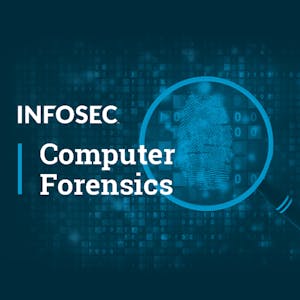In the Digital Forensics Concepts course, students will explore the legal considerations relevant to computer forensics, gaining an understanding of applicable laws and ethical practices. They will delve into the scientific principles underpinning digital forensics, learning about Locard’s Exchange Principle, the Scientific Method, and the handling of big data. The course also covers the practical aspects of digital forensics, including the identification, collection, and preservation of digital evidence, as well as the use of keyword lists, grep, and file hashing. Students will gain proficiency in on-scene triaging, preservation of digital evidence, and creating forensic disk images. Additionally, they will develop skills in network basics and reporting, with a focus on report writing and peer review.
Certificate Available ✔
Get Started / More Info
The Digital Forensics Concepts course covers a wide range of topics, including legal considerations, scientific principles, digital evidence collection, preservation, and reporting.
Welcome to the Digital Forensics Concepts course, where students are introduced to the fundamental concepts and methodologies of digital forensics. They will learn about the role of the examiner, forensic methodology, and the preparation of forensic workstations.
Module 2 focuses on legal considerations and search authority in digital forensics. Students will explore applicable laws, ethics, preservation, consent, and the process of obtaining search warrants and subpoenas.
This module delves into the investigation process, covering Locard’s Exchange Principle, the Scientific Method, and the handling of big data in digital forensics.
Here, students will learn about recognizing and collecting digital evidence, including preparation for the scene, documentation, recognition, collection, and proper storage and transportation of digital evidence.
Module 5 focuses on the preservation of evidence and on-scene triage, covering topics such as live vs. dead box evidence collection, capturing volatile media, and forensic boot options.
Students will gain an understanding of hash values and file hashing, including the function and uses of hashing, creating hash sets, and hashing files.
This module covers the process of creating a disk image, including sterilizing target media, validating tools, using write blockers, and creating and validating a forensic image using tools like Linux DD Command.
Module 8 focuses on keyword and grep searches, teaching students how to formulate case-specific keyword lists, review grep, use grep search, and perform keyword searching with autopsy.
This module provides an overview of network basics, including the definition of a network, IP and MAC addresses, internet protocols, and the OSI model.
Students will learn about report writing and peer review, understanding the importance of tool-generated reports, and the significance of peer review in digital forensics.
Finally, this module guides students through a digital forensics project, offering a walkthrough of questions, project hints, challenge questions, and project solutions.
This course equips you with the essential skills needed to become a successful cybersecurity analyst, covering digital forensics, incident response, penetration...
This course equips students with essential cybersecurity knowledge, from recognizing threats to configuring security zones on next-generation firewalls.
Prepare for a career in cybersecurity with Microsoft's Cybersecurity Analyst program. Gain hands-on experience and industry-recognized certification to protect organizations...
Securing the IoT Landscape: From Inception to Architecture offers a comprehensive understanding of IoT security, covering device identity, preventive measures, incident...